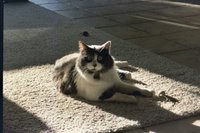


Today I drove to the Red Rock Overlook to see if any of the Loop fires were visible from that vantage point. At the overlook, the smell of fire filled the air. Thunder boomed and lightening flashed nearby. As I was getting out of my car, a park ranger walked up to me and told me I’d need to stay on the west side of the parking lot. The helicopter was scheduled to arrive on the east side of the parking lot in five minutes; it wasn’t landing, but instead was scooping up water to drop on a distant fire. “He’s just coming over to give us some help with this small fire,” Marty the park ranger told me. The big fire is in Lovell Canyon. Everyone in the parking lot snapped away as the helicopter roared in, dipped a bucket of water, and then choppered off to douse a small blaze.

